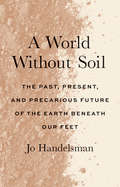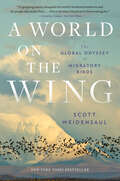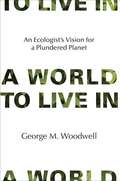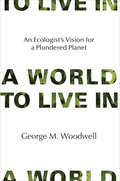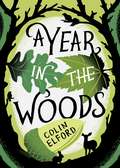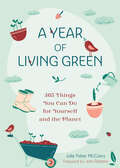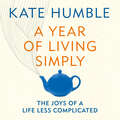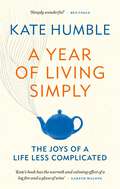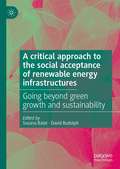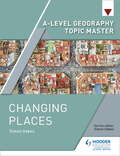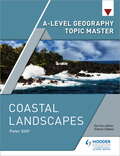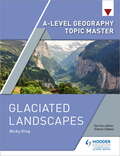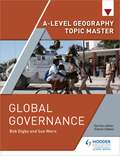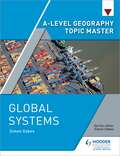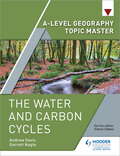- Table View
- List View
A World Without Soil: The Past, Present, and Precarious Future of the Earth Beneath Our Feet
by Jo HandelsmanA celebrated biologist's manifesto addressing a soil loss crisis accelerated by poor conservation practices and climate change &“Jo Handelsman is a national treasure, and her clarion call warning of a looming soil-loss catastrophe must be heard. Add her clearly written alarm to other future-shocks: climate change, pandemics, and mass extinctions.&”—Laurie Garrett, Pulitzer Prize winner and author of The Coming Plague: Newly Emerging Diseases in a World out of Balance &“The ground beneath our feet is slipping away as we lose the precious soil that sustains us. Jo Handelsman&’s writing—as rich and life supporting as the soil itself—is a riveting warning.&”—Alan Alda, actor, writer, and host of the podcast &“Clear+Vivid with Alan Alda&” This book by celebrated biologist Jo Handelsman lays bare the complex connections among climate change, soil erosion, food and water security, and drug discovery. Humans depend on soil for 95 percent of global food production, yet let it erode at unsustainable rates. In the United States, China, and India, vast tracts of farmland will be barren of topsoil within this century. The combination of intensifying erosion caused by climate change and the increasing food needs of a growing world population is creating a desperate need for solutions to this crisis. Writing for a nonspecialist audience, Jo Handelsman celebrates the capacities of soil and explores the soil-related challenges of the near future. She begins by telling soil&’s origin story, explains how it erodes and the subsequent repercussions worldwide, and offers solutions. She considers lessons learned from indigenous people who have sustainably farmed the same land for thousands of years, practices developed for large-scale agriculture, and proposals using technology and policy initiatives.
A World on the Wing: The Global Odyssey Of Migratory Birds
by Scott WeidensaulNew York Times Bestseller Finalist for the Los Angeles Times Book Prize A Library Journal Best Science and Technology Book of the Year An exhilarating exploration of the science and wonder of global bird migration. In the past two decades, our understanding of the navigational and physiological feats that enable birds to cross immense oceans, fly above the highest mountains, or remain in unbroken flight for months at a stretch has exploded. What we’ve learned of these key migrations—how billions of birds circumnavigate the globe, flying tens of thousands of miles between hemispheres on an annual basis—is nothing short of extraordinary. Bird migration entails almost unfathomable endurance, like a sparrow-sized sandpiper that will fly nonstop from Canada to Venezuela—the equivalent of running 126 consecutive marathons without food, water, or rest—avoiding dehydration by "drinking" moisture from its own muscles and organs, while orienting itself using the earth’s magnetic field through a form of quantum entanglement that made Einstein queasy. Crossing the Pacific Ocean in nine days of nonstop flight, as some birds do, leaves little time for sleep, but migrants can put half their brains to sleep for a few seconds at a time, alternating sides—and their reaction time actually improves. These and other revelations convey both the wonder of bird migration and its global sweep, from the mudflats of the Yellow Sea in China to the remote mountains of northeastern India to the dusty hills of southern Cyprus. This breathtaking work of nature writing from Pulitzer Prize finalist Scott Weidensaul also introduces readers to those scientists, researchers, and bird lovers trying to preserve global migratory patterns in the face of climate change and other environmental challenges. Drawing on his own extensive fieldwork, in A World on the Wing Weidensaul unveils with dazzling prose the miracle of nature taking place over our heads.
A World to Live In
by George M. WoodwellA century of industrial development is the briefest of moments in the half billion years of the earth's evolution. And yet our current era has brought greater changes to the earth than any period in human history. The biosphere, the globe's life-giving envelope of air and climate, has been changed irreparably. In A World to Live In, the distinguished ecologist George Woodwell shows that the biosphere is now a global human protectorate and that its integrity of structure and function are tied closely to the human future. The earth is a living system, Woodwell explains, and its stability is threatened by human disruption. Industry dumps its waste globally and makes a profit from it, invading the global commons; corporate interests overpower weak or nonexistent governmental protection to plunder the planet. The fossil fuels industry offers the most dramatic example of environmental destruction, disseminating the heat-trapping gases that are now warming the earth and changing the climate forever. The assumption that we can continue to use fossil fuels and "adapt" to climate disruption, Woodwell argues, is a ticket to catastrophe.But Woodwell points the way toward a solution. We must respect the full range of life on earth -- not species alone, but their natural communities of plant and animal life that have built, and still maintain, the biosphere. We must recognize that the earth's living systems are our heritage and that the preservation of the integrity of a finite biosphere is a necessity and an inviolable human right.
A World to Live In: An Ecologist's Vision for a Plundered Planet
by George M. WoodwellA scientist makes a powerful case that preservation of the integrity of the biosphere is a necessity and an inviolable human right.A century of industrial development is the briefest of moments in the half billion years of the earth's evolution. And yet our current era has brought greater changes to the earth than any period in human history. The biosphere, the globe's life-giving envelope of air and climate, has been changed irreparably. In A World to Live In, the distinguished ecologist George Woodwell shows that the biosphere is now a global human protectorate and that its integrity of structure and function are tied closely to the human future. The earth is a living system, Woodwell explains, and its stability is threatened by human disruption. Industry dumps its waste globally and makes a profit from it, invading the global commons; corporate interests overpower weak or nonexistent governmental protection to plunder the planet. The fossil fuels industry offers the most dramatic example of environmental destruction, disseminating the heat-trapping gases that are now warming the earth and changing the climate forever. The assumption that we can continue to use fossil fuels and “adapt” to climate disruption, Woodwell argues, is a ticket to catastrophe.But Woodwell points the way toward a solution. We must respect the full range of life on earth—not species alone, but their natural communities of plant and animal life that have built, and still maintain, the biosphere. We must recognize that the earth's living systems are our heritage and that the preservation of the integrity of a finite biosphere is a necessity and an inviolable human right.
A Year in the City (Season to Season)
by Christina Mia GardeskiFrom snow plows to skyscraper nests and rooftop gardens, life in the city changes from season to season. Discover what animals live in the city. Learn how smog forms in summer. Real-life photographs follow the seasons and capture the beauty of a year in the city.
A Year in the Forest (Season to Season)
by Christina Mia GardeskiFrom hibernation to baby animals and falling leaves, life in the forest changes from season to season. Discover why snow is good for trees. Learn how wildfires help the forest grow. Real-life photographs follow the seasons and capture the beauty of a year in the forest.
A Year in the Pond (Season to Season)
by Christina Mia GardeskiFrom ice skating to tadpoles and migrating birds, life in the pond changes from season to season. Discover how fish stay warm in winter. Learn why butterflies fly away in fall. Real-life photographs follow the seasons and capture the beauty of a year in the pond.
A Year in the Woods: The Diary of a Forest Ranger
by Colin ElfordColin Elford's A Year in the Woods is an enthralling journey into the heart of the English countryside - with a preamble by Craig Taylor.Colin Elford spends his days alone - alone but for the deer, the squirrels, the rabbits, the birds, and the many other creatures inhabiting the woods.From the crisp cold of January, through the promise of spring and the heat of summer, and then into damp autumn and the chill winds of winter, we accompany the forest-ranger as he goes about his work - stalking in the early morning darkness, putting an injured fallow buck out of its misery, watching stoats kill a hare, observing owls, and simply being a part of the outdoors.Colin Elford immerses himself in the richly diverse and unique landscapes of Britain, existing in rhythm with natural environments. For fans of Robert Macfarlane's Landmarks, Helen Macdonald's H is for Hawk orJames Rebanks' A Shepherd's Life, Colin's rare and uplifiting journey will unveil the true nature and beauty of Britain's countryside.'This is nature for real . . . Elford describes woodland wonders in short paragraphs of luminous intensity' Daily Mail'A poetic insight in the world of hidden Nature' Countryman'Stalking sharpens the senses and there is an almost hallucinatory clarity to Elford's writing' Observer'Refreshingly unsentimental. Contains some wonderful descriptions and sentences which are so profound they demand a second reading' Sunday ExpressColin Elford is a forest ranger on the Dorset/Wiltshire border. Craig Taylor is the author of Return to Akenfield and One Million Tiny Plays About Britain and the editor of the magazine Five Dials.
A Year of Living Green: 365 Things You Can Do for Yourself and the Planet
by Julie Fisher-McGarryDwell Well and Build a Better World“This book offers a low-impact lifestyle that will make your daily life easier and positively affect the Earth for generations to come.” —Cheryl Hahn, founder and president of Tomorrow's WorldA Year of Living Green is a daily chronicle or journal from author Julie Fisher-McGarry to help keep your mind and heart open to all that lives.Have a positive impact on the world.A Year of Living Green is a collection of nonreligious, yet deeply soulful suggestions for demonstrating concern, kindness, and consideration for nature and its animals. Organized by month, it includes tips on living green, where to purchase organic and fair-trade products, how to unplug from the grid, supporting local economies, nourishing the earth, and creating a sustainable lifestyle. Julie offers you daily personal anecdotes, inspiring quotations, verses of poetry, simple vegetarian recipes, women’s health tips, environmental facts, and green thoughts.Written especially for women. Julie Fisher-McGarry was once a personal fitness trainer to Saudi Arabian royalty, and now works to promote environmental issues in every way she can. A vegetarian since the 1980s, she has fought against animal cruelty and promoted better human health. A Year of Living Green was written especially for women because Julie believes that women are less afraid to show emotion and act upon it.Get a copy of A Year of Living Green and…Discover why individual acts really do matterLearn how to start small and make a big differenceSee how simple acts can inspire others and help build a better worldKeep a journal as you read along so that you can record your own green and compassionate ideas, plans, and daily actsIf you have read and learned from books such as The Four Agreements, A New Earth, The Path Made Clear, Have You Seen Luis Velez, No One Is Too Small to Make a Difference, Let it Go, or Pay It Forward; you will love A Year of Living Green.
A Year of Living Simply: The joys of a life less complicated
by Kate Humble'Simply wonderful.' - BEN FOGLE'Kate's book has the warmth and calming effect of a log fire and a glass of wine. Unknit your brow and let go. It's a treat.' - GARETH MALONE'Kate Humble pours her enviable knowledge into attainable goals. It's a winning combination and the prize - a life in balance with nature - is definitely worth claiming.' - LUCY SIEGLE'As ever, where Kate leads, I follow. She has made me reassess and reset.' - DAN SNOWIf there is one thing that most of us aspire to, it is, simply, to be happy. And yet attaining happiness has become, it appears, anything but simple. Having stuff - The Latest, The Newest, The Best Yet - is all too often peddled as the sure fire route to happiness. So why then, in our consumer-driven society, is depression, stress and anxiety ever more common, affecting every strata of society and every age, even, worryingly, the very young? Why is it, when we have so much, that many of us still feel we are missing something and the rush of pleasure when we buy something new turns so quickly into a feeling of emptiness, or purposelessness, or guilt?So what is the route to real, deep, long lasting happiness? Could it be that our lives have just become overly crowded, that we've lost sight of the things - the simple things - that give a sense of achievement, a feeling of joy or excitement? That make us happy. Do we need to take a step back, reprioritise? Do we need to make our lives more simple? Kate Humble's fresh and frank exploration of a stripped-back approach to life is uplifting, engaging and inspiring - and will help us all find balance and happiness every day.(p) 2020 Octopus Publishing Group
A Year of Living Simply: The joys of a life less complicated (Kate Humble)
by Kate Humble'Simply wonderful.' - BEN FOGLE'Kate's book has the warmth and calming effect of a log fire and a glass of wine. Unknit your brow and let go. It's a treat.' - GARETH MALONE'Kate Humble pours her enviable knowledge into attainable goals. It's a winning combination and the prize - a life in balance with nature - is definitely worth claiming.' - LUCY SIEGLE'As ever, where Kate leads, I follow. She has made me reassess and reset.' - DAN SNOW'Kate Humble's new book is a lesson in moving on from a tragedy and finding our place in the world' - WOMAN & HOME'A Year of Living Simply is timely, given that the pandemic has forced most of us, in some way to simplify our lives, whether we planned to or not. Kate wrote it before any of us were aware of the upcoming crisis, but it captures the current moment perfectly... It's not necessarily a "how to" book, more of a "why not try?" approach.' - FRANCESCA BABB, MAIL ON SUNDAY YOU'What I particularly love is her philosophy for happiness, which is the subject of her new book, A Year of Living Simply. The clue is in the title. Remember the basics. Instead of barging through the day on autopilot, really stop to think about the tiniest little things that added a moment of joy. No, of course stopping and smelling the flowers won't cure all our ills and woes. But taking the time to savour the things that bring pleasure, really being in that moment and appreciating it, can remind you that most days have moments that buoy your mood.' - JO ELVIN, MAIL ON SUNDAY YOUIf there is one thing that most of us aspire to, it is, simply, to be happy. And yet attaining happiness has become, it appears, anything but simple. Having stuff - The Latest, The Newest, The Best Yet - is all too often peddled as the sure fire route to happiness. So why then, in our consumer-driven society, is depression, stress and anxiety ever more common, affecting every strata of society and every age, even, worryingly, the very young? Why is it, when we have so much, that many of us still feel we are missing something and the rush of pleasure when we buy something new turns so quickly into a feeling of emptiness, or purposelessness, or guilt?So what is the route to real, deep, long lasting happiness? Could it be that our lives have just become overly crowded, that we've lost sight of the things - the simple things - that give a sense of achievement, a feeling of joy or excitement? That make us happy. Do we need to take a step back, reprioritise? Do we need to make our lives more simple? Kate Humble's fresh and frank exploration of a stripped-back approach to life is uplifting, engaging and inspiring - and will help us all find balance and happiness every day.
A Year on the Farm (Season to Season)
by Christina Mia GardeskiFrom mending fences to seedlings and combines, life on the farm changes from season to season. Discover what farmers do in winter. Learn how crops are harvested in fall. Real-life photographs follow the seasons and capture the beauty of a year on the farm.
A critical approach to the social acceptance of renewable energy infrastructures: Going beyond green growth and sustainability
by Susana Batel David RudolphThis book provides a critical approach to research on the social acceptance of renewable energy infrastructures and on energy transitions in general by questioning prevalent principles and proposing specific research pathways and lines of inquiry that look beyond depoliticised, business-as-usual discourses and research agendas on green growth and sustainability. It brings together authors from different socio-geographical and disciplinary backgrounds within the social sciences to reflect upon, discuss and advance what we propose to be five cornerstones of a critical approach: overcoming individualism and socio-cognitivism; repoliticisations – recognising and articulating power relations; for interdisciplinarity; interventions – praxis and political engagement with research; and overcoming localism and spatial determinism: As such, this book offers academics, students and practitioners alike a comprehensive perspective of what it means to be critical when inquiring into the social acceptance of renewable energy and associated infrastructures.
A-level Geography Topic Master: Changing Places
by Simon OakesExam board: AQA, Edexcel, OCR, WJEC/EduqasLevel: A-levelSubject: GeographyFirst teaching: September 2016First exams: Summer 2017 (AS); Summer 2018 (A-level)Master the in-depth knowledge and higher-level skills that A-level Geography students need to succeed; this focused topic book extends learning far beyond your course textbooks.Blending detailed content and case studies with questions, exemplars and guidance, this book:- Significantly improves students' knowledge and understanding of A-level content and concepts, providing more coverage of Changing Places than your existing resources- Strengthens students' analytical and interpretative skills through questions that involve a range of geographical data sources, with guidance on how to approach each task- Demonstrates how to evaluate issues, with a dedicated section in every chapter that shows how to think geographically, consider relevant evidence and structure a balanced essay- Equips students with everything they need to excel, from additional case studies and definitions of key terminology, to suggestions for further research and fieldwork ideas for the Independent Investigation- Helps students check, apply and consolidate their learning, using end-of-chapter refresher questions and discussion points, plus tailored advice for the AQA, Edexcel, OCR and WJEC/Eduqas specifications- Offers trusted and reliable content, written by a team of highly experienced senior examiners and reviewed by academics with unparalleled knowledge of the latest geographical theories
A-level Geography Topic Master: Changing Places
by Simon OakesExam board: AQA, Edexcel, OCR, WJEC/EduqasLevel: A-levelSubject: GeographyFirst teaching: September 2016First exams: Summer 2017 (AS); Summer 2018 (A-level)Master the in-depth knowledge and higher-level skills that A-level Geography students need to succeed; this focused topic book extends learning far beyond your course textbooks.Blending detailed content and case studies with questions, exemplars and guidance, this book:- Significantly improves students' knowledge and understanding of A-level content and concepts, providing more coverage of Changing Places than your existing resources- Strengthens students' analytical and interpretative skills through questions that involve a range of geographical data sources, with guidance on how to approach each task- Demonstrates how to evaluate issues, with a dedicated section in every chapter that shows how to think geographically, consider relevant evidence and structure a balanced essay- Equips students with everything they need to excel, from additional case studies and definitions of key terminology, to suggestions for further research and fieldwork ideas for the Independent Investigation- Helps students check, apply and consolidate their learning, using end-of-chapter refresher questions and discussion points, plus tailored advice for the AQA, Edexcel, OCR and WJEC/Eduqas specifications- Offers trusted and reliable content, written by a team of highly experienced senior examiners and reviewed by academics with unparalleled knowledge of the latest geographical theories
A-level Geography Topic Master: Coastal Landscapes
by Peter StiffExam board: AQA, Edexcel, OCR, WJEC/EduqasLevel: A-levelSubject: GeographyFirst teaching: September 2016First exams: Summer 2017 (AS); Summer 2018 (A-level)Master the in-depth knowledge and higher-level skills that A-level Geography students need to succeed; this focused topic book extends learning far beyond your course textbooks.Blending detailed content and case studies with questions, exemplars and guidance, this book:- Significantly improves students' knowledge and understanding of A-level content and concepts, providing more coverage of Coastal Landscapes than your existing resources- Strengthens students' analytical and interpretative skills through questions that involve a range of geographical data sources, with guidance on how to approach each task- Demonstrates how to evaluate issues, with a dedicated section in every chapter that shows how to think geographically, consider relevant evidence and structure a balanced essay- Equips students with everything they need to excel, from additional case studies and definitions of key terminology, to suggestions for further research and fieldwork ideas for the Independent Investigation- Helps students check, apply and consolidate their learning, using end-of-chapter refresher questions and discussion points, plus tailored advice for the AQA, Edexcel, OCR and WJEC/Eduqas specifications- Offers trusted and reliable content, written by a team of highly experienced senior examiners and reviewed by academics with unparalleled knowledge of the latest geographical theories
A-level Geography Topic Master: Coastal Landscapes Epub
by Peter StiffExam board: AQA, Edexcel, OCR, WJEC/EduqasLevel: A-levelSubject: GeographyFirst teaching: September 2016First exams: Summer 2017 (AS); Summer 2018 (A-level)Master the in-depth knowledge and higher-level skills that A-level Geography students need to succeed; this focused topic book extends learning far beyond your course textbooks.Blending detailed content and case studies with questions, exemplars and guidance, this book:- Significantly improves students' knowledge and understanding of A-level content and concepts, providing more coverage of Coastal Landscapes than your existing resources- Strengthens students' analytical and interpretative skills through questions that involve a range of geographical data sources, with guidance on how to approach each task- Demonstrates how to evaluate issues, with a dedicated section in every chapter that shows how to think geographically, consider relevant evidence and structure a balanced essay- Equips students with everything they need to excel, from additional case studies and definitions of key terminology, to suggestions for further research and fieldwork ideas for the Independent Investigation- Helps students check, apply and consolidate their learning, using end-of-chapter refresher questions and discussion points, plus tailored advice for the AQA, Edexcel, OCR and WJEC/Eduqas specifications- Offers trusted and reliable content, written by a team of highly experienced senior examiners and reviewed by academics with unparalleled knowledge of the latest geographical theories
A-level Geography Topic Master: Glaciated Landscapes (welsh Edition)
by Nicky KingExam board: AQA, Edexcel, OCR, WJEC/EduqasLevel: A-levelSubject: GeographyFirst teaching: September 2016First exams: Summer 2017 (AS); Summer 2018 (A-level)Master the in-depth knowledge and higher-level skills that A-level Geography students need to succeed; this focused topic book extends learning far beyond your course textbooks.Blending detailed content and case studies with questions, exemplars and guidance, this book:- Significantly improves students' knowledge and understanding of A-level content and concepts, providing more coverage of Glaciated Landscapes than your existing resources- Strengthens students' analytical and interpretative skills through questions that involve a range of geographical data sources, with guidance on how to approach each task- Demonstrates how to evaluate issues, with a dedicated section in every chapter that shows how to think geographically, consider relevant evidence and structure a balanced essay- Equips students with everything they need to excel, from additional case studies and definitions of key terminology, to suggestions for further research and fieldwork ideas for the Independent Investigation- Helps students check, apply and consolidate their learning, using end-of-chapter refresher questions and discussion points, plus tailored advice for the AQA, Edexcel, OCR and WJEC/Eduqas specifications- Offers trusted and reliable content, written by a team of highly experienced senior examiners and reviewed by academics with unparalleled knowledge of the latest geographical theories
A-level Geography Topic Master: Glaciated Landscapes (welsh Edition)
by Nicky KingExam board: AQA, Edexcel, OCR, WJEC/EduqasLevel: A-levelSubject: GeographyFirst teaching: September 2016First exams: Summer 2017 (AS); Summer 2018 (A-level)Master the in-depth knowledge and higher-level skills that A-level Geography students need to succeed; this focused topic book extends learning far beyond your course textbooks.Blending detailed content and case studies with questions, exemplars and guidance, this book:- Significantly improves students' knowledge and understanding of A-level content and concepts, providing more coverage of Glaciated Landscapes than your existing resources- Strengthens students' analytical and interpretative skills through questions that involve a range of geographical data sources, with guidance on how to approach each task- Demonstrates how to evaluate issues, with a dedicated section in every chapter that shows how to think geographically, consider relevant evidence and structure a balanced essay- Equips students with everything they need to excel, from additional case studies and definitions of key terminology, to suggestions for further research and fieldwork ideas for the Independent Investigation- Helps students check, apply and consolidate their learning, using end-of-chapter refresher questions and discussion points, plus tailored advice for the AQA, Edexcel, OCR and WJEC/Eduqas specifications- Offers trusted and reliable content, written by a team of highly experienced senior examiners and reviewed by academics with unparalleled knowledge of the latest geographical theories
A-level Geography Topic Master: Global Governance
by Bob Digby Sue WarnExam board: AQA, Edexcel, OCR, WJEC/EduqasLevel: A-levelSubject: GeographyFirst teaching: September 2016First exams: Summer 2017 (AS); Summer 2018 (A-level)Master the in-depth knowledge and higher-level skills that A-level Geography students need to succeed; this focused topic book extends learning far beyond your course textbooks.Blending detailed content and case studies with questions, exemplars and guidance, this book:- Significantly improves students' knowledge and understanding of A-level content and concepts, providing more coverage of Global Governance than your existing resources- Strengthens students' analytical and interpretative skills through questions that involve a range of geographical data sources, with guidance on how to approach each task- Demonstrates how to evaluate issues, with a dedicated section in every chapter that shows how to think geographically, consider relevant evidence and structure a balanced essay- Equips students with everything they need to excel, from additional case studies and definitions of key terminology, to suggestions for further research and fieldwork ideas for the Independent Investigation- Helps students check, apply and consolidate their learning, using end-of-chapter refresher questions and discussion points, plus tailored advice for the AQA, Edexcel, OCR and WJEC/Eduqas specifications- Offers trusted and reliable content, written by a team of highly experienced senior examiners and reviewed by academics with unparalleled knowledge of the latest geographical theories
A-level Geography Topic Master: Global Governance
by Bob Digby Sue WarnExam board: AQA, Edexcel, OCR, WJEC/EduqasLevel: A-levelSubject: GeographyFirst teaching: September 2016First exams: Summer 2017 (AS); Summer 2018 (A-level)Master the in-depth knowledge and higher-level skills that A-level Geography students need to succeed; this focused topic book extends learning far beyond your course textbooks.Blending detailed content and case studies with questions, exemplars and guidance, this book:- Significantly improves students' knowledge and understanding of A-level content and concepts, providing more coverage of Global Governance than your existing resources- Strengthens students' analytical and interpretative skills through questions that involve a range of geographical data sources, with guidance on how to approach each task- Demonstrates how to evaluate issues, with a dedicated section in every chapter that shows how to think geographically, consider relevant evidence and structure a balanced essay- Equips students with everything they need to excel, from additional case studies and definitions of key terminology, to suggestions for further research and fieldwork ideas for the Independent Investigation- Helps students check, apply and consolidate their learning, using end-of-chapter refresher questions and discussion points, plus tailored advice for the AQA, Edexcel, OCR and WJEC/Eduqas specifications- Offers trusted and reliable content, written by a team of highly experienced senior examiners and reviewed by academics with unparalleled knowledge of the latest geographical theories
A-level Geography Topic Master: Global Systems
by Simon OakesExam board: AQA, Edexcel, OCR, WJEC/EduqasLevel: A-levelSubject: GeographyFirst teaching: September 2016First exams: Summer 2017 (AS); Summer 2018 (A-level)Master the in-depth knowledge and higher-level skills that A-level Geography students need to succeed; this focused topic book extends learning far beyond your course textbooks.Blending detailed content and case studies with questions, exemplars and guidance, this book:- Significantly improves students' knowledge and understanding of A-level content and concepts, providing more coverage of Global Systems than your existing resources- Strengthens students' analytical and interpretative skills through questions that involve a range of geographical data sources, with guidance on how to approach each task- Demonstrates how to evaluate issues, with a dedicated section in every chapter that shows how to think geographically, consider relevant evidence and structure a balanced essay- Equips students with everything they need to excel, from additional case studies and definitions of key terminology, to suggestions for further research and fieldwork ideas for the Independent Investigation- Helps students check, apply and consolidate their learning, using end-of-chapter refresher questions and discussion points, plus tailored advice for the AQA, Edexcel, OCR and WJEC/Eduqas specifications- Offers trusted and reliable content, written by a team of highly experienced senior examiners and reviewed by academics with unparalleled knowledge of the latest geographical theories
A-level Geography Topic Master: Global Systems
by Simon OakesExam board: AQA, Edexcel, OCR, WJEC/EduqasLevel: A-levelSubject: GeographyFirst teaching: September 2016First exams: Summer 2017 (AS); Summer 2018 (A-level)Master the in-depth knowledge and higher-level skills that A-level Geography students need to succeed; this focused topic book extends learning far beyond your course textbooks.Blending detailed content and case studies with questions, exemplars and guidance, this book:- Significantly improves students' knowledge and understanding of A-level content and concepts, providing more coverage of Global Systems than your existing resources- Strengthens students' analytical and interpretative skills through questions that involve a range of geographical data sources, with guidance on how to approach each task- Demonstrates how to evaluate issues, with a dedicated section in every chapter that shows how to think geographically, consider relevant evidence and structure a balanced essay- Equips students with everything they need to excel, from additional case studies and definitions of key terminology, to suggestions for further research and fieldwork ideas for the Independent Investigation- Helps students check, apply and consolidate their learning, using end-of-chapter refresher questions and discussion points, plus tailored advice for the AQA, Edexcel, OCR and WJEC/Eduqas specifications- Offers trusted and reliable content, written by a team of highly experienced senior examiners and reviewed by academics with unparalleled knowledge of the latest geographical theories
A-level Geography Topic Master: The Water and Carbon Cycles
by Andrew Davis Garrett NagleExam board: AQA, Edexcel, OCR, WJEC/EduqasLevel: A-levelSubject: GeographyFirst teaching: September 2016First exams: Summer 2017 (AS); Summer 2018 (A-level)Master the in-depth knowledge and higher-level skills that A-level Geography students need to succeed; this focused topic book extends learning far beyond your course textbooks.Blending detailed content and case studies with questions, exemplars and guidance, this book:- Significantly improves students' knowledge and understanding of A-level content and concepts, providing more coverage of The Water and Carbon Cycles than your existing resources- Strengthens students' analytical and interpretative skills through questions that involve a range of geographical data sources, with guidance on how to approach each task- Demonstrates how to evaluate issues, with a dedicated section in every chapter that shows how to think geographically, consider relevant evidence and structure a balanced essay- Equips students with everything they need to excel, from additional case studies and definitions of key terminology, to suggestions for further research and fieldwork ideas for the Independent Investigation- Helps students check, apply and consolidate their learning, using end-of-chapter refresher questions and discussion points, plus tailored advice for the AQA, Edexcel, OCR and WJEC/Eduqas specifications- Offers trusted and reliable content, written by a team of highly experienced senior examiners and reviewed by academics with unparalleled knowledge of the latest geographical theories
A-level Geography Topic Master: The Water and Carbon Cycles
by Andrew Davis Garrett NagleExam board: AQA, Edexcel, OCR, WJEC/EduqasLevel: A-levelSubject: GeographyFirst teaching: September 2016First exams: Summer 2017 (AS); Summer 2018 (A-level)Master the in-depth knowledge and higher-level skills that A-level Geography students need to succeed; this focused topic book extends learning far beyond your course textbooks.Blending detailed content and case studies with questions, exemplars and guidance, this book:- Significantly improves students' knowledge and understanding of A-level content and concepts, providing more coverage of The Water and Carbon Cycles than your existing resources- Strengthens students' analytical and interpretative skills through questions that involve a range of geographical data sources, with guidance on how to approach each task- Demonstrates how to evaluate issues, with a dedicated section in every chapter that shows how to think geographically, consider relevant evidence and structure a balanced essay- Equips students with everything they need to excel, from additional case studies and definitions of key terminology, to suggestions for further research and fieldwork ideas for the Independent Investigation- Helps students check, apply and consolidate their learning, using end-of-chapter refresher questions and discussion points, plus tailored advice for the AQA, Edexcel, OCR and WJEC/Eduqas specifications- Offers trusted and reliable content, written by a team of highly experienced senior examiners and reviewed by academics with unparalleled knowledge of the latest geographical theories
